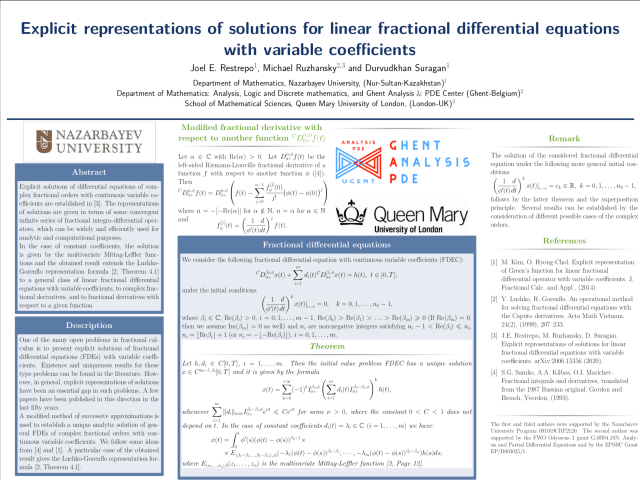Partial Differential Equations (PDEs) is a super-vast area of Mathematical Analysis and its Applications in Science, Technology, Economy, and Medicine. Modeling natural phenomena within any science is where PDEs arise, and their analysis as well as theory itself produce many questions for mathematicians to give answers.
Our group works on Analysis of PDEs in several directions. We study PDE equations of various types and employ different techniques and methods in solving and analysing equations and systems. Topics are classical and modern, applied and pure…
Linear and nonlinear PDEs
We carry out the analysis related to linear and nonlinear evolution PDEs, and we are working in several directions…
Hyperbolic systems
This area has many important examples such as Maxwell equations, equations of acoustics, coupled equations, etc. We work on the advancement of our results for equations with time-dependent coefficients given in [GR13,GR17] on the well-posedness theory for equations and systems with multiplicities and with variable coefficients for which relatively little is currently known. The idea is to extend the constructions recently developed for time-dependent coefficients in [GJ17] to the variable coefficients setting.
The key point in this analysis is the transformation of the original (arbitrary) m × m system to a larger m2 × m2 system in the block Sylvester form, preserving the eigenvalues of the system. Although the resulting system is larger in size, its block Sylvester form allows for the effective use of the D’Ancona-Spagnolo quasi-symmetrisation techniques.
We are also interested in systems with multiplicities, for example, having Jordan blocks in the principal part. Here we carry out well-posedness and microlocal analysis [GJR18, GJR20]
!!!NEW!!! [GJR20] Garetto, Claudia; Jäh, Christian; Ruzhansky, Michael; Hyperbolic systems with non-diagonalisable principal part and variable multiplicities, II: Microlocal analysis. J. Differential Equations, 269 (2020), no. 10, 7881–7905.
[GJR18] Garetto C., Jäh C., Ruzhansky M., Hyperbolic systems with non-diagonalisable principal part and variable multiplicities, I: well-posedness, Math. Ann., 372 (2018), 1597–1629. offprint (open access), arxiv, link
[GR13]. C. Garetto, M. Ruzhansky, Weakly hyperbolic equations with non-analytic coefficients and lower order terms, Math. Ann., 357 (2013), 401-440.
[GR17] C. Garetto, M. Ruzhansky. On hyperbolic systems with time dependent Hölder characteristics, Ann. Mat. Pura Appl., 196 (2017), 155-164.
[GJ17] Garetto, C., Jäh, C. Well-posedness of hyperbolic systems with multiplicities and smooth coefficients. Math. Ann., 369 (2017), 441–485.
Kirchhoff equations
The global well-posedness of the Kirchhoff equation for large smooth data is a problem open for more than 100 years. We have been working on the resolution of this problem, and we have extended all known results for small data [MR13], while for large data we prove the almost global existence for large Gevrey data [MR19], as well as in interior and exterior domains [MR17].
We are working on other very challenging questions concerning the well-posedness of Kirchhoff equations and on the surrounding scope of problems for linear and nonlinear hyperbolic PDEs.
[MR19] Matsuyama, Tokio ; Ruzhansky, Michael. On the Gevrey well-posedness of the Kirchhoff equation. J. Anal. Math., 137 (2019), no. 1, 449–468.
[MR13] T. Matsuyama, M. Ruzhansky. Global well-posedness of Kirchhoff systems, J. Math. Pures Appl., (2013), 220-240.
[MR17]T. Matsuyama, M. Ruzhansky. Almost global well-posedness of Kirchhoff equation with Gevrey data. C. R. Math. Acad. Sci. Paris, 355 (2017), 522-525.
Dispersive and Strichartz estimates, smoothing and large-time asymptotics
Here the main problem is to find out what geometric properties are responsible for time decay rates and integrability orders in dispersive and Strichartz estimates.
We have obtained a general description for hyperbolic equations with constant coefficients and for their time-dependent perturbations, as well as for hyperbolic equations with time-variable coefficients or for oscillating perturbations. These results were further applied to Grad systems, Fokker–Planck equations, as well as Kirchhoff equations and systems, including long-standing questions of the global in time well-posedness and scattering for nonlinear perturbations of classical Kirchhoff equations. Results on these researches are collected in a memoir [RS] and the book [C-UFMW].
[RS] Ruzhansky M., Smith J., Dispersive and Strichartz estimates for hyperbolic equations with constant coefficients, MSJ Memoirs, Vol. 22, Mathematical Society of Japan, Tokyo, 2010. x+147pp.
[C-UFMW] Cruz-Uribe D., Fiorenza A., Ruzhansky M., Wirth J., Variable Lebesgue spaces and hyperbolic systems, Advanced Courses in Mathematics – CRM Barcelona, Vol. 27, Birkhäuser, 2014.
The scheme leading to the global in time well-posedness:
dispersive estimate → Strichartz/smoothing → fixed point/iteration/bootstrap → nonlinear PDEs
We now work on global constructions for space-dependent problems with a new approach to smoothing estimates for evolution equations.
The method is based on the new type of global analysis of Fourier integral operators obtaining a series of results ranging from global estimates ([RS06]) for them, to applications to PDEs ([RS12]). The developed techniques are applied to a wide range of evolutions equations of dispersive [RS12a] and nondispersive [RS16] types.
[RS06] Ruzhansky, M., Sugimoto, M. A smoothing property of Schrödinger equations in the critical case, Math. Ann., 335 (2006), 645-673.
[RS12] Ruzhansky M., Sugimoto M., Structural resolvent estimates and derivative nonlinear Schrödinger equations, Comm. Math. Phys., 314 (2012), 281-304.
[RS12a] Ruzhansky M., Sugimoto M. Smoothing estimates of evolution equations via canonical transforms and comparison, Proc. London Math. Soc., 105 (2012), 393-423.
[RS16] Ruzhansky M., Sugimoto M., Smoothing estimates for non-dispersive equations. Math. Ann., 365 (2016), 241-269.
“… introducing comparison principles for model cases, we showed that in fact almost all global smoothing estimates for almost all dispersive equations with constant coefficients are equivalent to each other!”
Our newest results:
!!!NEW!!! [FR20] Federico S., Ruzhansky M., Smoothing and Strichartz estimates for degenerate Schrödinger-type equations. arxiv
… we focus on the validity of fundamental estimates for time-degenerate Schrödinger-type operators: global homogeneous smoothing estimates for operators of any order by means of suitable comparison principles and we prove weighted Strichartz-type estimates for time-degenerate Schrödinger operator…
* * *
Further topics concerns the analysis of such equations with time-depending coefficients of low regularity (Hölder and lower) by the use of the concept of very weak solutions.
Pseudo-differential operators
PDEs are a special case of a more general notion. We work actively and a lot in this area – see our page on Pseudo differential operators.
Very weak solutions
A concept for treating strong singularities in PDE’s, new and a very promising far-reaching research direction. For more details go to our page Very weak solutions.
Fractional Differential Equations
These are PDEs including derivatives of non-integer order, fractional derivatives. This is another very HoT TopiC – see our page on Fractional derivatives.
Ruzhansky, M., Tokmagambetov, N. ; Torebek, B. T. On a non-local problem for a multi-term fractional diffusion-wave equation. Fract. Calc. Appl. Anal., 23 (2020), no. 2, 324–355.








